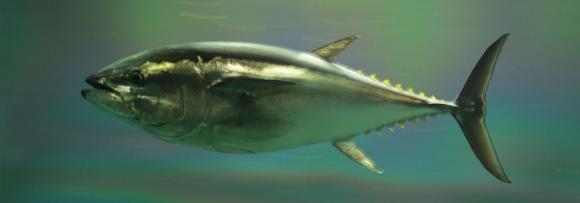 The Pacific bluefin tuna is at risk of becoming commercially extinct. Overfishing has depleted stocks of the fish by an estimated 97%. Now the principle tuna-fishing nations have reached an agreement to gradually rebuild the depleted stocks, while still allowing Japan, by far the largest consumer of the bluefin, to continue to catch and consume the highly prized fish. Japan eats 80 percent of the $42 billion global haul of bluefin and had resisted restrictions on the fishery.
The Pacific bluefin tuna is at risk of becoming commercially extinct. Overfishing has depleted stocks of the fish by an estimated 97%. Now the principle tuna-fishing nations have reached an agreement to gradually rebuild the depleted stocks, while still allowing Japan, by far the largest consumer of the bluefin, to continue to catch and consume the highly prized fish. Japan eats 80 percent of the $42 billion global haul of bluefin and had resisted restrictions on the fishery.
As reported by the Washington Post: At the week-long meeting in Busan, South Korea, the two bodies charged with shared management of Pacific bluefin — the northern committee of the Western and Central Pacific Fisheries Commission and the Inter-American Tropical Tuna Commission — hammered out a plan to try to put the fish back on a path to sustainability. Countries represented at the meeting included the United States, Canada, China, South Korea and Japan.
At the meeting, the two organizations agreed to a target to rebuild tuna stocks to 20 percent of historic levels by 2034, the minimum level that scientists consider necessary to protect the species.
Proponents of limits hailed the deal as a compromise that everyone could live with.
“It’s definitely a good first step towards the recovery of the species,” said James Gibbon, global tuna conservation officer at the Pew Charitable Trusts. “But it is only the first step. There are a lot of commitments that the countries agreed to, and we need to make sure they stick to them.”

Great…from Germany!
I remember being in EYE OF THE WIND some years ago when we heard that
a fishing boat was being chased out of Australian waters suspected of illegally fishing for Blue Finn Tuna, the Australians with the help of South Africa flew a special forces squad to arrest the Togo registered fishing boat. After a 1200 mile chase and an SAS style drop from the air the surprised fishermen who thought they had got away with it were found to have 300 ton of the then protected species aboard, I believe at the time that was the longest sea chase the Australians had undertaken the year 1997 I think?
The key statistic here is “42 billion dollars” The tuna can’t compete with the money that can be made by the continued fishing for them, legal and illegal.
Great story Chris Roche! And as always, thanks Rick.